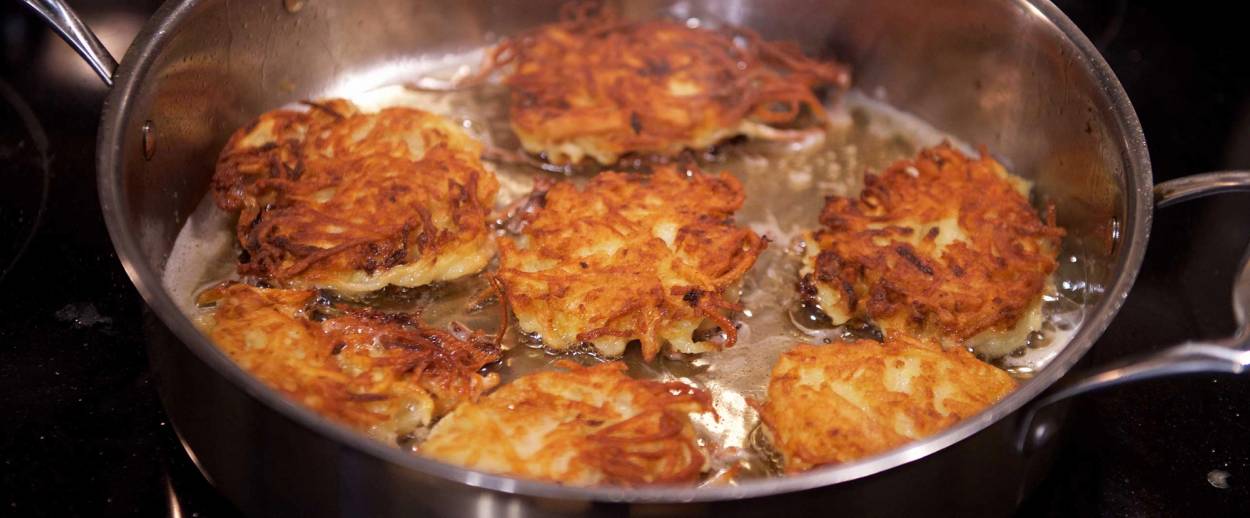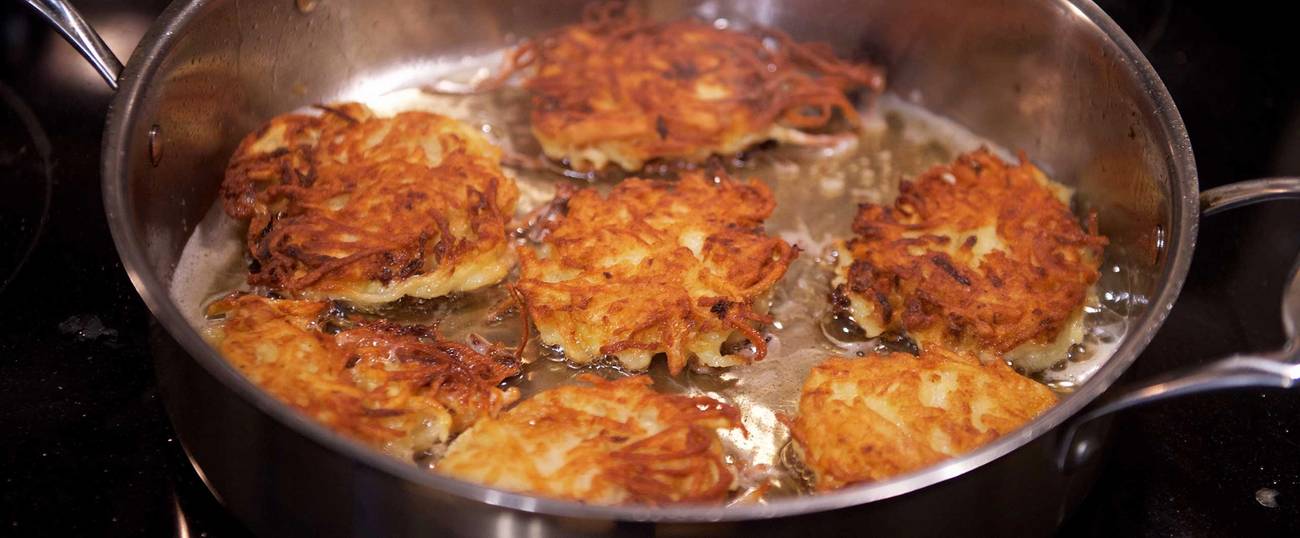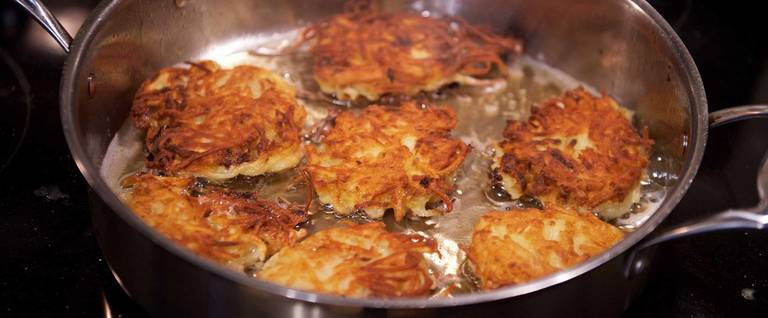It’s blue, still glossy, though its corners are frayed, and I grab it every December, the only time I sacrifice myself at the altar of the root. I can hardly believe I am doing it again, after the previous year, and the one before, and the one before that. From my station, where I drink red wine by the deafening sizzle of two skillets as they seize the grated mush and transform it into food, I catch distant glimpses of flames in the living room fireplace. Guests float in and out, some joining me at the stove for a time, others offering small plates of food they prepared and schlepped through the dark slick night. My children rotate in and out, flanked by their friends in search of treats: tall young men with hungry eyes politely awaiting my invitation, lanky teen girls tossing their shiny hair out of the way as they grab and devour the freshly made pancakes.
The secret ingredient lives on a shelf in the butler’s pantry—we have a pantry, but no butler—where the rest of the year it collects dust, and I take it down a few days before. It’s more a ritual than a necessity, seeing as how you could wake me up from a dead sleep at 2:00 a.m., drag me into the kitchen, set out the ingredients before me, and, with my eyes slammed shut, I could whip up a perfectly serviceable batch of latkes. But it’s a talisman, a thread that stitches a disjointed life into one whole.
The Temple Emanu-El Sisterhood Cook Book was first published in 1958, 18 years before my family emigrated from the Soviet Union, where the full extent of my Jewishness manifested as an annual pillowcase full of matzo completely divorced from its meaning, and the epithet “Zhid” flung at me by a classmate. The cookbook—put together by the Conservative congregation in Providence, Rhode Island—was republished three more times, with my copy dating to 1973, a pre-desktop samizdat printed on a typewriter and lacking fancy flourishes and photoshopped snaps of styled dishes. Its simple pages, stained with grease and discolored by time, hurl just the facts of the recipes and the names of their contributors: Mrs. Paul Schretter’s blintzes, Mrs. Manuel Bromberg’s kreplach. A bulky blue plastic spine fastens together these lost identities, carefully processed from laughing schoolgirls with flying braids and soaring dreams into bejeweled and made-up wives with perfect coiffures, whose Shabbos manicures I am hard-pressed to imagine submerged in a vat of grated potato and egg slime.
Such subsumption of identity was foreign to me, fresh to this soil in the late 1970s. My mother hadn’t taken my father’s name after they married, remaining her original self, at least in this respect. Neither did many of her friends and colleagues. A Soviet woman was not automatically expected to drop her maiden name upon nuptials. The militant secularism of the USSR demanded this facade of egalitarianism, in which women, at least nominally, had equal standing with men. But just like the lofty promises of prosperity and the insistent reports of Soviet overachievement, this, too, was propaganda that held no credibility even to its creators. Throughout my childhood my mother, an engineer with a full-time day job, rushed home in the evening to run to our communal kitchen, her heels click-clacking down the cavernous hallways, bundles in hand, to cook our evening meal, while I did my homework and Dad read. She, too, was the one responsible for washing dishes (in cold running water in a shared gritty metal sink in the same distant communal kitchen), cleaning our room on weekends, and doing our laundry. She was the one delegated to toilet duty as well, when it was our family’s turn to clean the communal toilet, cracked and graying, whose odor of piss and antiseptic rivaled the most populous of public johns of the great European capitals. And it wasn’t until my father’s death that she was free to express her own opinions on such varied subjects as food, movies, and politics without harassment or contempt.
Paradoxically, or perhaps precisely because of the indignities of her daily life, she did find time to bake. Baking was her canvas. Her masterpieces were an elaborate Napoleon tort, whose layers, bound by custard, required several days of preparation, and éclair pastries, puffy and light, ceding their creamy secrets to my greedy tongue. The Napoleon was reserved for my birthdays, and in the run-up to the party, she kept a platter with a mounting heap of pastry sheets wrapped in a towel in the corner of our single room behind the bulky wardrobe, where all the domestic surpluses of her meager life were kept: extra bed linens, towels, blankets, and, on these occasions, confectionery. I recall her running to and from the kitchen those three or four evenings that it took to mix and bake enough of the crispy discs to achieve the desired skyscraper height. The day before the festivity, to give the pastry enough time to soften, she would cement them with custard into a tower topped with crumbled remains of one of the dry layers, as punishment for its having come out of the oven imperfect. It was the pièce de résistance at the end of a raucous party, whose crown jewel was a line dance: a dozen pre-adolescent girls, singing at the tops of their lungs, skirts and hair bobbing up and down as we kicked and hopped thunderously, to the slightly delayed rhythmic accompaniment of clanging silverware, around the table that strained from the weight of the now decimated food. The Napoleon’s multistoried magnificence had only lasted a fraction of a minute before the energized swarm devoured it like locusts.
This and other collected recipes survive in a homespun recipe book that sits on a bookshelf in my mother’s kitchen. When we were readying to leave Odessa, my father typed and hand bound them into a thin tome with a piece of cream-colored cardboard he had scored from work. The rules for what could be taken out of the country in luggage were strict and, unsurprisingly, arbitrary, or, more likely, deliberately and vindictively designed to maximize frustration and inconvenience. Border agents, drunk on the cheap vodka and a fleeting sense of self-importance, were empowered to confiscate anything resembling unsanctioned documents. To avoid such losses and humiliations, “documents” could be certified and sent through diplomatic channels; i.e., the Dutch consulate. And so I imagine how this compilation of old family recipes traveled to our new land as a top-secret file slipped into a classified attaché case hand cuffed to an agent’s wrist. Its destiny has been to sit unused and mostly forgotten because, as Mom discovered early in our stay in the U.S., the recipes required serious adaptations due to the richness of local ingredients—butter and eggs from well-fed livestock, flour enriched beyond its natural composition, each a radical contrast to its stripped and diluted Soviet counterpart. Here in America, her busy life as a working wife and mother did not support this kind of culinary experimentation.
But despite all the limitations placed on her, she did get to keep her family’s name, at least until the puzzled officials in Vienna, who midwifed our transit westward, pointed out that it would be easier on everyone if we all just had the same last name. Ever since, she has gone by Zilberberg, though she drew the line at erasing her first name in favor of my father’s—as so many of the women in the Temple Emanu-El Sisterhood Cook Book had done.
The latke recipe I use is on page 241 of the Temple Emanu-El Sisterhood Cook Book. It is from Mrs. Jack Glantz. I didn’t hang out with her offspring when, in my adolescence, I attended this synagogue, where I learned about the Epic of Gilgamesh, and that instead of “you’re welcome,” the equivalent Hebrew phrase translates to “over nothing.” The page is blemished by brown spatters of various sizes, aged potato juice masquerading as coffee stains. None is large enough to obscure any portion of the recipe whose resilience must somehow reflect the resilience of the dish itself, passed through continents and generations, stubbornly withstanding repeated attempts at extermination.
6 med. size potatoes
1 onion
2 eggs
1/2 cup flour
1 teasp. salt
Vegetable shortening or oil for deep frying
I don’t really keep to the suggested proportions. I just peel and grate until I run out of potatoes, crack eggs until I have had enough cracking, and add flour to get the right consistency. Yet I find it necessary to keep the book open to this page, a sanctified reminder of the interconnectedness of all these lives, each discrete in its details, all mixed into this tradition, like the strands of potato in the eggy batter in my bowl.
It wasn’t until just three years ago that I learned the importance of squeezing the juice out of the potatoes. Despite the recipe’s terse admonition to “Squeeze out liquid,” my execution was perfunctory. My friend R, tall and ruddy cheeked, with hands the size of Manhattan, scrutinized my process, mischief in his blue eyes, and said, “You want me to squeeze these for you?” I said yes, and stood with my mouth agape at the amount of additional juice those paddles of his were able to express from the vegetable as it got limper by the second. The very picture of a Protestant, R somewhere along the way got infected with the love for Jewish cuisine. Once he brought a mouthwatering brisket to the party, the kind that would make an edentulous bubbe from the depths of The Pale weep. Another time he made a liver pate rivaling my mother’s, which is saying a lot since, as the family lore claims, my father married her after she fed him this exquisite dish. The fact that the beguiling batch was actually prepared by her mother, my grandmother, did not emerge until much later. But the revelation did not seem to detract from my father’s pleasure in the pates my mother learned to prepare over their lifetime together.
At the last party my dear old friend M, another goy with enormous palms, was charged with wringing the grated slivers, wrapped in a tea towel, to their peak dryness. He obliged, groaning and reddening with the effort. It’s no wonder my mother and grandmothers preferred making kartofel’niki—pancakes made with mashed, rather than grated, potatoes. When the effort requires well muscled fit youngish men with oversize appendages to break a sweat in order to achieve optimal product, it’s OK for smaller, older, busier women caught in the vise of totalitarianism to forgo the ritual. And anyway, light and crispy at the beginning of the night, my latkes devolved into oil-soaked dense hockey pucks later on, as both our patience and ambition for squeezing thinned with time and the repeated tipping of zinfandel. Nevertheless, in the end the guests had eaten every last one, as happens every year. My mother’s banana bread enjoyed the same fate.
I love this party. It’s more than a celebration. It’s a reminder of how fortunate I am to have the freedom to maintain this tradition that tethers me to something timeless and big, and at the same time to break out of the constraints it once imposed on the women that came before me. The recipes in the Temple Emanu-El Sisterhood Cook Book are a trail of breadcrumbs they left for me, those women lost to pogroms, to the indignities of communal kitchens, and to the demands of beauty parlors and their husbands’ names. Their defiant girlish laughter echoes in my ears every time I stare into the book’s stained thinning pages.
Like this article? Sign up for our Daily Digest to get Tablet magazine’s new content in your inbox each morning.


